- Home
- Medical news & Guidelines
- Anesthesiology
- Cardiology and CTVS
- Critical Care
- Dentistry
- Dermatology
- Diabetes and Endocrinology
- ENT
- Gastroenterology
- Medicine
- Nephrology
- Neurology
- Obstretics-Gynaecology
- Oncology
- Ophthalmology
- Orthopaedics
- Pediatrics-Neonatology
- Psychiatry
- Pulmonology
- Radiology
- Surgery
- Urology
- Laboratory Medicine
- Diet
- Nursing
- Paramedical
- Physiotherapy
- Health news
- Fact Check
- Bone Health Fact Check
- Brain Health Fact Check
- Cancer Related Fact Check
- Child Care Fact Check
- Dental and oral health fact check
- Diabetes and metabolic health fact check
- Diet and Nutrition Fact Check
- Eye and ENT Care Fact Check
- Fitness fact check
- Gut health fact check
- Heart health fact check
- Kidney health fact check
- Medical education fact check
- Men's health fact check
- Respiratory fact check
- Skin and hair care fact check
- Vaccine and Immunization fact check
- Women's health fact check
- AYUSH
- State News
- Andaman and Nicobar Islands
- Andhra Pradesh
- Arunachal Pradesh
- Assam
- Bihar
- Chandigarh
- Chattisgarh
- Dadra and Nagar Haveli
- Daman and Diu
- Delhi
- Goa
- Gujarat
- Haryana
- Himachal Pradesh
- Jammu & Kashmir
- Jharkhand
- Karnataka
- Kerala
- Ladakh
- Lakshadweep
- Madhya Pradesh
- Maharashtra
- Manipur
- Meghalaya
- Mizoram
- Nagaland
- Odisha
- Puducherry
- Punjab
- Rajasthan
- Sikkim
- Tamil Nadu
- Telangana
- Tripura
- Uttar Pradesh
- Uttrakhand
- West Bengal
- Medical Education
- Industry
Stress hyperglycemia ratio predicts post-MI new-onset AF in non-diabetic individuals

China: A recent study has revealed that diabetes patients having both high-stress hyperglycemia ratio (SHR) and new-onset atrial fibrillation (NOAF) are at the highest risk of adverse cardiovascular events.
The findings, published in Diabetes/Metabolism Research and Reviews, suggest that therapies targeting SHR may be considered in these patients. Stress hyperglycemia ratio is a novel index proposed by researchers to characterise stress hyperglycemia, which is calculated from acute blood glucose and glycosylated haemoglobin (HbA1c) levels.
The researchers led by Jiachen Luo, Tongji University School of Medicine, Shanghai, China, reported stress hyperglycemia ratio to be an independent predictor of post-MI (myocardial infarction) new-onset atrial fibrillation.
NOAF is a common complication during the acute phase of acute myocardial infarction (AMI) with a reported incidence rate between 5% to 21%. Previous studies have shown that AMI patients developing NOAF are at a significantly higher risk of cardiovascular outcomes versus those with sinus rhythm. A dose-response relationship exists between NOAF severity and poor survival, highlighting the need for post-MI NOAF prevention. Therefore, it is of great importance to determine the modifiable risk factors of post-MI NOAF, which will provide novel preventive and therapeutic targets to reduce NOAF incidence.
The investigators used data from the New-Onset Atrial Fibrillation Complicating Acute Myocardial Infarction in ShangHai (NOAFCAMI-SH) registry to evaluate the predictive value and risk stratification performance of SHR for post-MI NOAF in a retrospective study.
The study included 2145 AMI patients without a history of atrial fibrillation between 2014 to 2018. Multivariable logistic regression analyses were used to evaluate the association between SHR and post-MI NOAF.
The study's primary outcome was a composite of ischaemic stroke, recurrent MI, heart failure hospitalisation, and cardiac death. Cox regression-adjusted hazard ratios were estimated for MACE (major adverse cardiovascular event).
The study revealed the following findings:
- 11.4% of patients developed new-onset atrial fibrillation.
- In the multivariable logistic regression analyses, SHR (each 10% increase) was significantly associated with increased risks of NOAF in the whole population (OR: 1.05), particularly in non-diabetic individuals (OR:1.08).
- During a median follow-up of 2.7 years, 18.5% of MACEs were recorded.
- The optimal cut-off value of SHR for MACE prediction was 1.119.
- Patients with both high SHR (≥1.119) and NOAF possessed the highest MACE risk compared to those with neither high SHR nor NOAF after multivariable adjustment (HR: 2.18), particularly for diabetics (HR: 2.63). Similar findings were observed using competing-risk models.
"Our landmark analyses further showed that increased MACE risk in Group 4 existed only within the first year after discharge," the researchers wrote.
"These findings add to the current body of knowledge and may guide clinical decision-making by suggesting that specific therapies targeting SHR may be performed in the early stage after AMI to reduce the incidence of NOAF and improve prognosis."
"Further prospective studies are needed to address this issue," they concluded.
Reference:
Luo, J., Li, Z., Qin, X., Zhang, X., Liu, X., Zhang, W., Xu, W., Liu, B., & Wei, Y. Association of stress hyperglycemia ratio with in-hospital new-onset atrial fibrillation and long-term outcomes in patients with acute myocardial infarction. Diabetes/Metabolism Research and Reviews, e3726. https://doi.org/10.1002/dmrr.3726
Dr Kamal Kant Kohli-MBBS, DTCD- a chest specialist with more than 30 years of practice and a flair for writing clinical articles, Dr Kamal Kant Kohli joined Medical Dialogues as a Chief Editor of Medical News. Besides writing articles, as an editor, he proofreads and verifies all the medical content published on Medical Dialogues including those coming from journals, studies,medical conferences,guidelines etc. Email: drkohli@medicaldialogues.in. Contact no. 011-43720751


